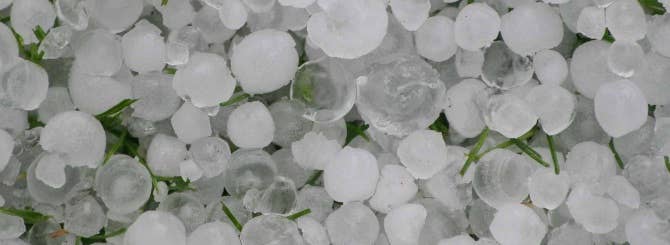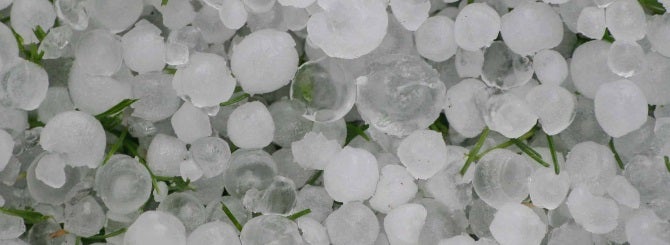Violent weather and a shock tariff impact on Italian wines dominate the headlines in this week’s news round-up.

© Shutterstock | Southern France has been strafed by hailstones over the past week, causing headaches for grapegrowers.
This week, we learned that the Mexican navy’s tall ship, the Cuauhtémoc, which crashed into the Brooklyn Bridge on May 17, killing two sailors, was due to be in Bordeaux for next month’s Fête du Vin wine festival. Unsurprisingly, its transatlantic trip has been cancelled.
Meanwhile newspapers and magazines in France were full of images of a dramatic accident in the south of France last weekend after a container forklift tipped while maneuvering a 30,000-liter ISO wine tanker, upending the wine tank and wounding the driver of the forklift.
The incident, which happened at a distribution center near the Spanish border, immediately provoked a cleanup response from the authorities with fears that the wine (and/or diesel and oil) might leak from the striken vessels.
The majority of the white wine in the container was safely pumped from the ISO.
Here are some other headlines from last week:
Hail storms and rain batter France
French vineyards have had a rough time of the weather of late, with localized hailstorms hitting some parcels two weeks ago in southern Bordeaux and parts of Cognac. Since then, weather events continue to cause headaches for French viticulturists.
Localized hail storms hit areas across the Aude and Hérault regions of southern France on May 11. Further hail fell on May 13, hitting vines in Irouléguy.
“In some cases, canes were broken,” said regional newspaper Sud-Ouest. “At this time of year, the consequences may not be permanent, depending on the weather conditions over the next few weeks. But in any case, the winegrowers concerned will have to remain extremely vigilant.”
It was a similar story in southern Champagne, with hail also hitting certain vineyard parcels in Bagneux-la-Fosse and Avirey-Lingey in the Côte des Bar subregion.
“I have a plot that was more affected than the others, particularly in terms of the grapes,” Stéphane Gonzales of Champagne Gremillet told local newspaper Est-Eclair on May 14. “We’re going to start treatments to prevent the vines from becoming too stressed and try to heal the wounds a little.”
According to wine news website Vitisphere, further hail fell between the vineyards of Bugey and Savoie in eastern France. More hail fell on the 14th, in the Tavel region of southern France.
More recently, vineyards in the Var and Provence have been particularly badly hit with a major storm event slamming into the region on Tuesday.
“We’ve had everything: erosion, landslides, new plantings swept away by waves of water, vines in the Vin de Pays [zone] submerged to the top of the posts – it’s unheard of at this time of year,” Pascal Étienne, president of Les Vignerons de Grimaud winegrowers’ cooperative told Vitisphere.
“It’s looking bad,” he added. “We’re looking at where to intervene and praying that it dries as quickly as possible. Everything is happening at the same time: flowering as well as the already-present mildew pressure.”
Italy exports “worrying”
Recently released export figures for Italian wines to non-EU countries are down almost 9 percent in volume – a “worrying” sign, according to industry insiders.
The export figures, released this week by the Italian Wine Union (UIV) Observatory showed first quarter, non-EU exports were down almost 9 percent in volume and down 0.1 percent in value. Exports to the US – a major area of concern for many wine industries, following trade tariff announcements by the US administration – were actually up 4 percent over this period, although March figures (the last month of the Q1 report) showed a slowdown.
Lamberto Frescobaldi, who heads-up the UIV said much of the non-EU growth was due to a “pre-tariff rush” on Italian wines – a phenomenon also noted by their Spanish counterparts last week.
“In the last six months we have witnessed an apparent paradox: Italian shipments to the United States seemed to be holding up or even growing in some sectors, but the real data on consumption tell a different, much more worrying story,” he told Sky News. The pre-tariff rush has painted a false picture in the market but the reality is something else: consumption is falling or, at best, stagnant.”
Wines recalled over glass in bottles
Several batches of wine produced by well-known southern Rhône cooperative Cellier des Dauphins have been recalled across France over fears the bottles may contain pieces of glass. Four batches from the Cellier des Dauphins Prestige 2023 label fall under the countrywide recall, which covers wines sold from January to May 2025 and spans a vast number of outlets.
It is understood the wines were sold across a number of major French supermarket chains, including Leclerc, Intermarché, Carrefour, Casino, Metro, Franprix and Coopérative U. The wine is a major line for the cooperative, which often bottles it under the Côtes du Rhône appellation although it has, in some iterations, appeared under the IGP Mediterranée title.
According to national product recall website RappelConso, some bottles could contain pieces of glass due to a manufacturing fault.
“A [bottle] production incident is said to have caused broken glass to appear inside some [bottles],” said the official text, which underlined that the contamination had not come from the wine. “This defect makes the wine unfit for consumption and could pose a risk of injury if swallowed.”
The wine lots in question are L25016, L25056, L25083, and L25084, bearing the barcode: 3179071000978.
Wine labels feature in Argentinian torture case
Specially defaced wine labels have featured in a recent article revisiting the disappearance of Peronist activist Jorge Julio López in Argentina.
According to an article on the case, published in Spanish online news site El Español, López’s disappearance was highlighted in public consciousness by architect and artist-activist Hugo René Vidal, who developed a special stamp to overlay words on top of wine labels by local producer Bodegas López.
Vidal would stamp the wine label with the words “Aparición con vida de Julio” (“Appear alive, Julio”), above the prominent “Lopez” of the wine label. The artist would then return the bottles to the shelf in supermarkets.
The protest was one of several in the late 2000s aimed at rekindling public consciousness in López’s second disappearance in 2007 and examples of the bottles (as well as a blank wall calendar for every year since López’s disappearance) were recently on display as part of the Forests of Memory exhibition in the San Telmo Museum in San Sebastián, Spain.
López’s testimony in the 2000s (his first kidnapping was in the late 1970s, when the country was under military rule) was crucial, both as victim and witness, to the prosecution of Miguel Etchecolatz, former head of Buenos Aires police in the late 1970s, as well as charges against 70 military and police officers.
Since the end of the military Junta regime and the return to democracy in the mid 1980s, Etchecolatz had been in and out of prison for his role as police commissioner during the years of state repression (1976-1983). By 2006, he had been charged with, and found guilty of, crimes against humanity including kidnapping, torture and murder.
It is believed Etchecolatz or his supporters were behind López’s second (and final) disappearance in September 2006. He has not been seen since he left his home for the court (Etchecolatz’s life sentence for the above crimes was announced a day later).
Fraud office clashes with behemoth
France’s regional Workplace Ministry (DREETS) has taken on industry behemoth Grands Chais de France (via its Loire subsidiary, the Maison Lacheteau négoce operation), accusing the latter of unfair commercial practices in its contracts with grape growers.
The move, which began with a court summons in February, follows investigations by the French fraud office (DGCCRF) into contracts between Lacheteau and growers in the region. The ministry is claiming the grape contracts unjustly penalised growers by factoring in winemaking costs to the final (grape) price.
The authorities claim this falls foul of France’s relatively new Egalim law, which seeks to protect producers of agricultural raw materials from unfair practices, in this case through their purchaser.
“This refers to the winemaking costs detailed [in] a grape purchase contract the calculation of the purchase price based on that of a finished wine minus production costs,” said French wine news website Vitisphere. “This method of calculating the difference between the price of grapes and the wine that would be targeted [by investigators]: being perceived as a form of back-end margin.”
The initial summons said that 44 growers had been unfairly hit by the contracts. Officials believe Grands Chais de France (GCF), via Lacheteau, generated €2.2 million in profits through the agreements and are requesting fines of €6.6 million.
The GCF operation has, unsurprisingly, pushed back, claiming the contracts in question (which span a three-year period from 2016 to 2018) were in line with industry standard.
“The practices mentioned in the summons fall within the professional practices established in the Loire wine-growing region,” said GCF in a press release. “The practices complained of are common, historically accepted, known, and accepted practices throughout the wine industry.”
“These contractual provisions cannot be considered abusive practices as long as they are applied in a transparent and balanced manner,” it went on. “In this regard, Maison Lacheteau benefits from the support of winegrowers and the clear and public backing of unions and professional organizations in the viticulture and trade sectors.”
Indeed, other parties have spoken up in defence of GCF, including the head of France’s national wine trade body, the CNIV (Comité National des Interprofessions des Vins à appellation d’origine et à indication géographique), Bernard Farges, also former head of Bordeaux’s wine trade body, the CIVB (Conseil Interprofessionnel du Vin de Bordeaux).
“We believe that these practices were known to all, accepted by all, with contracts signed by winegrowers and merchants on a long-standing practice in this region where the contractualization of grape purchases is important,” he told Vitisphere last week.
“We are surprised and worried by the stance of the authorities on this issue that we would have liked to be more educational” Farges added, saying that while it is an established and transparent practice of price construction: “starting from a wine price, deducting a vinification cost known and accepted by both parties to have a grape price shows transparency in price construction.”
The case is still before the courts.
Cité du Vin charge thrown out
A public finance embezzlement charge leveled by a Dijon politician against those behind the construction of the town’s Cité de la Gastronomie et du Vin has been thrown out by the public prosecutor.
Right-wing politician Emmanuel Bichot claimed public finances had been misappropriated in the construction of the building (see “Cité du Vin caught in €5m embezzlement charge” in Pope’s Special Burgundy Supply) through a doubling-up of rebates. However, an official rebuttal by the Mayor of Dijon’s office says the public prosecutor has dismissed the allegations “comprehensively”.
It also claims the initial complaint was politically motivated.
“This decision […], adopted following a careful examination of the documents submitted, confirms the total lack of foundation in the accusations made by Mr. Bichot,” said a press release from the mayor’s office. “Once again, a clear attempt to use the justice system for political ends has failed.”
Furthermore, the mayor’s office said it was itself filing an official complaint against the politician for slander.
“For several years, Mr. Bichot has filed numerous appeals against the City of Dijon and Dijon Métropole, all of which have been rejected by the competent courts,” it said. “This complaint is part of a long series of unsuccessful attempts to weaken local institutions […].”
To join the conversation, comment on our social media channels.


Dining and Cooking